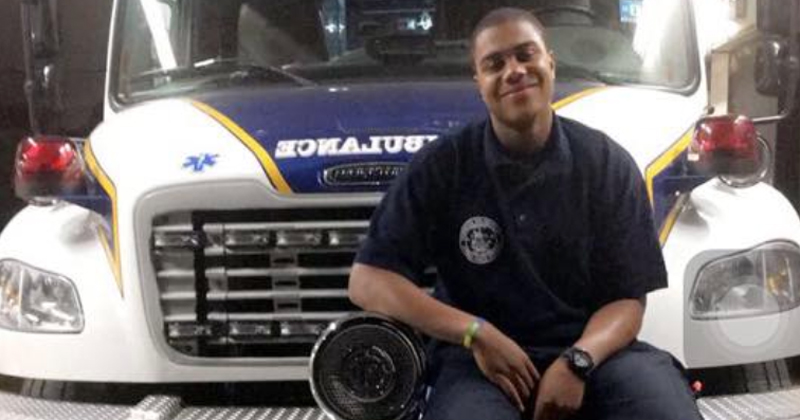


On the front lines of a pandemic
Photo courtesy of Kevin Gibbs June 15, 2020
Blue Hen Kevin Gibbs working as an EMT in the New York City region
University of Delaware student Kevin Gibbs had a few extra wrinkles to iron out as he finished up the spring semester at his home in Teaneck, N.J. In addition to navigating his online instruction, Gibbs faced another challenge - working as an emergency medical technician in the New York City area during April and May, when the region was the epicenter of the COVID-19 pandemic.
Gibbs, 21, has been working as an EMT since he was 16 years old. In addition to volunteering with his hometown of Teaneck Township, N.J., he works for a hospital-based emergency medical service that serves New York City as well as a private EMS service. When he’s home from UD on break, he’s usually working at one of the three jobs.
During the height of the COVID-19 pandemic in New York City, his part-time job morphed into full-time responsibilities. Emergency calls jumped 45%. Gibbs worked 40 to 60 hours a week, often handling as many as 20 patients — most suspected of having coronavirus — during his 12-hour shifts.
For Gibbs, whose mother and sister work in healthcare in New York City and who is considering a post-college career in law enforcement like his father, the desire to help others in need is innate. This past year, he worked as a resident assistant in the South Academy residence hall and served as a senator for UD Student Government Association.
“I can’t sit here and literally do nothing,” said Gibbs, a senior sports health major beginning his graduate coursework for the hybrid 3+2 Athletic Training Education Program, within the College of Health Sciences. “I just wanted to help out in whatever way I could.”
Adapting to changing protocols
After working as an EMT for five years, Gibbs understands there’s nothing typical about spending the day in an ambulance. But the unprecedented nature of the coronavirus quickly changed the way he and other EMTs did their jobs.
As the number of COVID-19 cases spiked in the area, their safety protocols changed to reduce the risk of transmission. Concerns about running out of personal protective equipment (PPE) meant that instead of two people assigned to enter the home of a patient, only one went in, stretching PPE supplies over the shift. Calls took two or three times longer than usual because EMTs had to dress in full PPE. After every call, the stretcher and ambulance had to be wiped down, even if the patient wasn’t suspected of having COVID-19.
Because everyone in the family had the potential to come into contact with infected patients, Gibbs said they made rules about coming home from work. Everyone changed their clothes at the door and put their clothes in the laundry. The family still does daily temperature checks and additional cleaning, even though the cases are no longer at their highest levels.
“There are risks in anything you take in life. You have to put yourself out there and make the best of it,” Gibbs said.
Despite the challenges, Gibbs said he couldn’t help but feel inspired by those around him, including emergency personnel who came from Arizona, Nevada, Wyoming and other parts of the country to help with the flood of coronavirus patients seeking care.
“It was gratifying to see people coming from all over to help out where it was needed,” he said.
Jeff Schneider, clinical education coordinator for the Athletic Training Education Program, remembered Gibbs as a freshman criminal justice major when he took Schneider’s emergency care course. With his interest in treating injuries and previous experience caring for people, Schneider said, it made sense for Gibbs to make the jump into the athletic training program.
“He has a tremendous work ethic and strong passion for health care,” he added.
Juggling school with work
Rather than rest on his days off, GIbbs logged onto his laptop to keep up with his online instruction. Most of his professors were unaware of his extracurricular endeavors at home — and he wanted to keep it that way.
“I don’t want that to be an excuse. I know in the real world you’re going to have deadlines,” Gibbs said. “I had to ask for one extension. I had an assignment due at 11 a.m., and I thought it was 11 p.m.”
Eric Greska saw that determination in his classroom as Gibbs’ professor. Even after that, Gibbs would pass by his office in the Fred Rust Arena on his way to class, always taking time to say hello or stop in to chat for a few minutes.
“Knowing Kevin's work ethic and determination, as well as his support for his peers, it does not surprise me that he committed to helping those in need and putting his own health at risk while still maintaining his academics,” said Greska, an assistant professor in the Department of Kinesiology and Applied Physiology.
These days, Gibbs is still busy, although the workload from his job has returned to more typical levels. That’s good timing as he starts the graduate portion of his athletic training program.
Gibbs credits his sister with providing him with time management skills to keep up his demanding schedule without letting anything drop. That’s why he’ll pull out homework during slow stretches on the job.
“A lot of older people have told me to take in every moment,” he said. “This has helped me to see that tomorrow is never guaranteed.”
Contact Us
Have a UDaily story idea?
Contact us at ocm@udel.edu
Members of the press
Contact us at 302-831-NEWS or visit the Media Relations website

